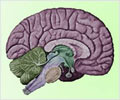In terms of the risk of Alzheimer's disease, while genetically determined variants of the disease play a role, genetics represents one aspect of the overall picture.

Effect of apolipoprotein genotype and educational attainment on cognitive function in autosomal dominant Alzheimer’s disease
Go to source). Researchers investigated the influence of genetics and educational attainment on cognitive decline by studying data from 675 people who carry a mutation that predisposes them to early onset Alzheimer's disease. Carriers of this mutation—known as PSEN1 E280A—have a median age of 49 for onset of dementia.
‘Greater educational achievement might offer a safeguard against cognitive impairment, even when significant genetic risk factors are present. #alzheimerdisease’





The team found that among carriers who also carried a second mutation that puts them at heightened risk—APOE e4—had an accelerated age of onset of cognitive decline. Among carriers who had an APOE e2 mutation—known to be protective—age of onset was delayed. “Despite the additional risk conferred by APOEe4, the strongest genetic risk factor for sporadic Alzheimer's disease, our results suggest that educational attainment may be a critical mechanism of cognitive reserve in familial Alzheimer’s disease,” said corresponding author Yakeel Quiroz PhD, a clinical neuropsychologist and neuroimaging researcher, director of the Familial Dementia Neuroimaging Lab in the Departments of Psychiatry and Neurology at Massachusetts General Hospital.
The research team included investigators from Massachusetts General Hospital, Brigham and Women’s Hospital, Mass Eye and Ear, and national and international collaborators.
Reference:
- Effect of apolipoprotein genotype and educational attainment on cognitive function in autosomal dominant Alzheimer’s disease - (https://www.nature.com/articles/s41467-023-40775-z)









